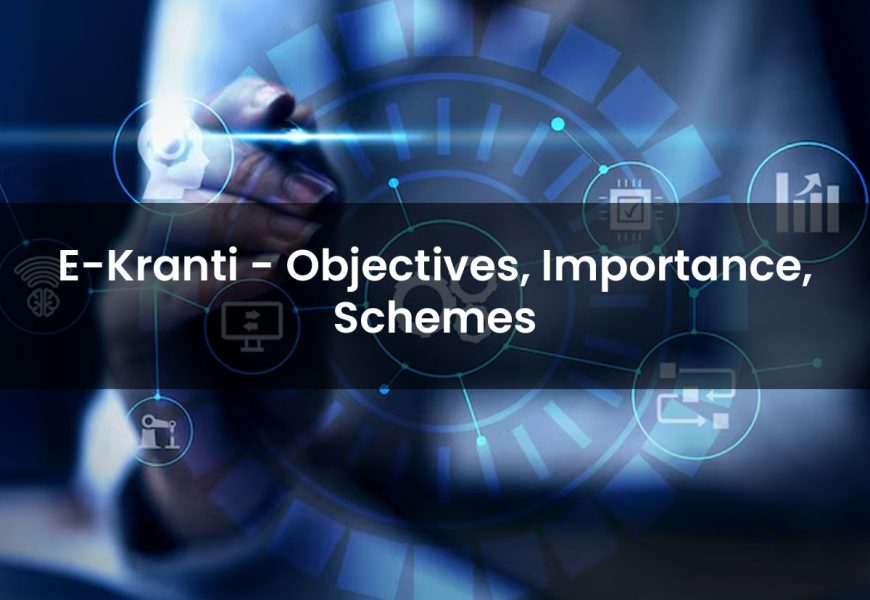
E-Kranti is an integral part of the Digital India Programme launched in India that promises to change how government services are delivered and accessed through digital platforms. Through the National e-Governance Plan (NeGP), e-Kranti ensures the enhancement of e-governance processes for easy flow, transparency, efficiency, and inclusiveness in all service delivery across the nation. An initiative by the Department of Electronics and Information Technology, E-Kranti is an initiative to make India a digitally empowered society and information-based economy.
This article describes e-Kranti, objectives, components, principles, and the key mission modes while discussing its potential for enhancing governance across sectors.
What is E-Kranti?
E-Kranti is a sub-initiative of the Digital India Programme, aimed at making reforms in government services by technological changes. It was approved by the Cabinet on 25 March 2015. This integrates digital tools and technologies for the enhancement of e-government capabilities. This enhances citizen-centric services. Its prime focus is in integrating an interoperable manner with a set of e-services through digitalizing public services nationwide.
Digitization of services alone is not the objective of e-Kranti; the objective also includes changing the nature of governance and bringing improvement in service delivery. With cloud computing, mobile technologies, and big data analytics, e-Kranti will look to make the process of government more transparent, efficient, and citizen-friendly.
Components of E-Kranti

Digital Infrastructure
Developing a strong, scalable, and secure digital infrastructure across the country to deliver government services while making public services available for access through digital mediums.
E-Services
Ensuring that government services are always available online; citizens get to access services without physical interaction.
Digital Literacy
Developing a digital-literate citizen proficient in using these online services.
These components make it possible for citizens, particularly in rural areas, to have access to basic public services in a seamless, efficient, and user-friendly manner.
Objectives of E-Kranti
The overarching objective of e-Kranti is to transform governance through digital technologies, which includes several core objectives:
- Expansion of E-Governance Applications
- By developing and deploying e-Governance solutions, e-Kranti expands the scope of services offered to citizens.
- Optimizing the use of existing ICT resources
- Maximize and scale services.
- Interoperable Service Delivery
- Support delivery of services across departments and bring together services into seamless interfaces for citizens.
- Adopting Next Generation Technologies
- e-Kranti promotes next-generation technologies such as cloud computing and big data to improve service delivery and governance.
- Agility and Flexibility
- e-Kranti will be able to fast-track the implementation of agile solutions for technological advancements, avoiding delays in project execution.
The programs are designed to enhance transparency, access, and efficiency, making it accountable to the public for any government processes.
Key Principles of E-Kranti
Transformation, Not Translation
Every initiative under e-Kranti must lead to a significant change in the quality and delivery of service delivery, not mere digitization of processes. Elimination of manual systems with innovative service delivery models.
Integrated Services, Not Individual Services
Unlike other conventional e-Governance projects that concentrate on individual departments, e-Kranti integrates services across multiple sectors to create seamless service delivery. This means that citizens will no longer need to interact separately with various departments, thus making the process more efficient.
Government Process Re-engineering (GPR)
e-Kranti re-engineers the government process to eliminate waste and cut unnecessary steps. This has streamlined processes thus enhancing delivery.
Mobile First Approach
Because of their heavy adoption, e-Kranti favors services provided using mobile. That way, through smartphones, maximum reach will be reached for the service.
Accelerating Approvals
Bring mechanisms to speed up approvals that cut procedural delay to make e-Governance implementation faster.
E-Kranti Focus Areas
E-Education
This seeks to enhance digital literacy with initiatives like PMGDISHA, which is a Pradhan Mantri Gramin Digital Saksharta Abhiyaan that provides quality education through online platforms, as well as SWAYAM, which is the Study Webs of Active Learning for Young Aspiring Minds.
E-Healthcare
This initiative includes online medical consultations, digital medical records, and telemedicine, thereby improving access to healthcare and reducing visits to healthcare facilities.
Support to Farmers
This initiative includes online medical consultations, digital medical records, and telemedicine, which improve access to healthcare while reducing visits to healthcare institutions.
Financial Inclusion
E-Kranti will enhance mobile banking services, extend financial services to underdeveloped areas, and facilitate financial inclusion across India.
e-Justice
Various services under the criminal justice system, such as e-Courts and e-Police, are integrated, which makes the criminal justice system more efficient and the administration of justice smoother.
Cyber Security
To ensure the safety of digital services, e-Kranti encourages the use of strong cyber security measures, such as the National Cyber Security Policy.
Mission Modes
E-Kranti functions under different MMPs, which have been divided into Central, State, and Integrated projects. These projects address specific challenges in key areas of governance and service delivery, such as:
Central Mission Mode Projects
These are initiatives in the form of Income Tax, Passport, Pensions, Banking, and e-Office that look at central government department services improvements.
State Mission Mode Projects
These are more state-specific initiatives focusing on improvement in such services as Land Records, Road Transport, Health, Education, and Police.
Integrated Mission Mode Projects
These all fall within the e-Procurement, e-Courts, National GIS, and Financial Inclusion projects across sectors and towards integrated, citizen-centric services.
Conclusion
E-Kranti is transforming the delivery of government services in India. Using digital technologies such as cloud computing, mobile platforms, and big data analytics, e-Kranti improves transparency, efficiency, and accessibility at all levels of government. Ideas like integration, transformation, and continuous innovation are the pillars to the success of e-Kranti as it keeps itself abreast with the fast-digitalizing India. Mission Mode Projects have been utilized under e-Kranti for taking on sectors like education, healthcare, agriculture, and justice as the most vital points, setting in a roadmap for an inclusive, transparent, and digitally empowered nation.
Read Also – Why Is the Skill India Revolution Important?







